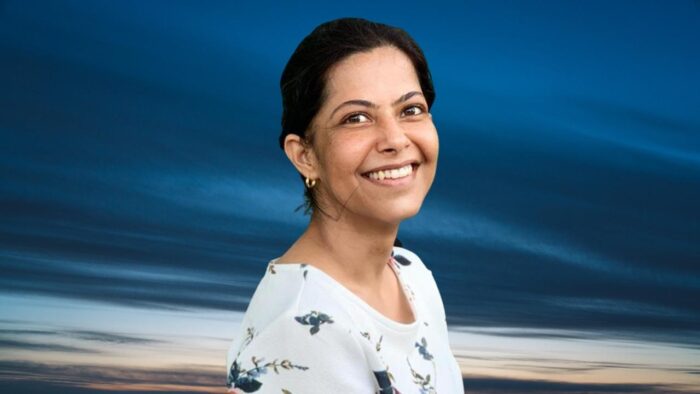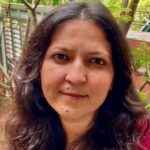Dr Nidhi Choudhary PhD, Yoga, was born into spirituality — her hometown, Rishikesh, is India’s spiritual capital, and she’s been influenced by its energy since she was born. She started practising yoga with senior BKS Iyengar teacher, Brahmacharya Rudradev Gowda, while she was in college and once she finished her Bachelor’s, she knew her Master’s and PhD would have to be on yoga. While doing her Master’s, she realised the lack of knowledge about Polycystic Ovary Syndrome (PCOS) and did her PhD research on the effects of yoga on PCOS. Seeing the positive results of yoga on PCOS, Dr Nidhi decided to specialise in yoga for women’s health and trains yoga teachers on how to teach pre and post-natal yoga. In conversation with Indica Yoga:
Sophia: How did your journey to yoga begin?
Dr Nidhi: My hometown is Rishikesh. I was born and raised there so I think I was influenced by yoga and spirituality since I was a child. My elder sister is also a yoga teacher so watching her inspired me as well. After I completed junior college (class 12) in 2001, one of my cousins had come to visit and she had come to Rishikesh specifically to practise yoga. She told me that since I was on holiday from college anyway, I should go with her for yoga so I went. She asked me to join her for a few days and then she wanted to continue with the practice and I was to leave in three days. But, after practising, I loved it so much that I stayed the entire course. In fact she left, and I continued to stay and practise. I was studying with a senior BKS Iyengar teacher, Brahmacharya Rudradev Gowda. I continued practising with him for three years through my Bachelor’s degree, and after my Bachelor’s in Microbiology, I had to choose which subject I wanted to do my Master’s in, and instead of pursuing a Master’s in Microbiology, I chose to do one in Yoga instead. I had realised by then that I want to practise and teach yoga so I moved to Bangalore and did a two-year course on yoga, and then I also moved to Pune and attended classes with Yogacharya BKS Iyengar. I started teaching in 2005.
Sophia: You said you stayed back to study yoga even after your cousin left. What inspired you to do so?
Dr Nidhi: It was a strong experience and then a strong feeling that convinced me. Those three days turned into years, and I spent that time studying with Brahmacharya Rudradev Gowda. I knew that I wanted to pursue yoga as a life path. To tell you the truth, when I was pursuing my degree in yoga, I didn’t enjoy it that much (laughs). A degree was something I studied for at university and was bound by those norms. What I experienced in Rishikesh was my real learning. The peace, calm and at the same time energy I felt after each class with Gowdaji is incomparable to a classroom experience. Those first three years were the foundation for all my learning.
Sophia: What was it like learning directly under Yogacharya BKS Iyengar?
Dr Nidhi: I knew he was my Guru that first day I met him. In fact (laughs), after I attended Guruji’s classes, I realised why my teacher in Rishikesh, Brahmacharya Rudradev Gowda, is the way he is (laughs). All Iyengar teachers reflect Guruji. The way they talk, the language they use for instruction, the discipline (laughs) — it’s all the same. The experience of learning with Guruji was amazing. He truly has made yoga available to everyone. And what I love about the Iyengar practice is how beautifully it can be adapted to each student’s requirement. The use of props to both challenge a student and aid students who might be suffering from a medical condition is proof of how versatile and effective this practice is. I feel this adaptability is Iyengar Yoga’s gift to the world. The use of props also enables teachers to help students experience a posture for a longer duration — there are just so many benefits to this practice.
Sophia: You specialise in pre and post-natal yoga, and focus on women’s health. What made you choose that as a focus area for your PhD research and work?
Dr Nidhi: During my Master’s, I had done a project on “Effects of Stress on Working Women,” and when I had to pick a research topic for my PhD, I wanted to address women’s health as I feel it is relevant so I chose to focus on Polycystic Ovary Syndrome (PCOS). It was a very new topic and that’s the reason I chose it. There wasn’t enough research on this condition, and I wanted to find how yoga affected the condition. I started my PhD in 2008 and published my findings in 2013 - 2014. We had done the first PCOS evaluation in India to check its prevalence, and we were also the first in the world to study the effects of yoga on PCOS. What’s interesting though is during my research and by the time I completed my PhD, PCOS had gained prevalence and was being diagnosed a lot more. After my PhD, I worked with an infertility expert in Bangalore and she allowed me to work with her patients for infertility and one of the major factors contributing to infertility was PCOS. During that time, I was working with women before pregnancy and even to aid pregnancy but I wanted to enable them to use yoga throughout their pregnancy as I knew its benefits. So I continued teaching prenatal yoga and in 2016, when I had a baby, I did a lot more research and studied all areas associated with the prenatal state and even started teaching more in-depth, and then started training yoga teachers to teach pregnant women.
Sophia: What about yoga for menopause?
Dr Nidhi: Yes! Not just preganancy but even menopause can be eased with regular practise of yoga.
Sophia: You conduct special courses on how to teach pre and postnatal yoga. Do you think this course is beneficial even if one is already a certified yoga teacher?
Dr Nidhi: Teaching pregnant women requires special knowledge and that is why I teach pre and post-natal yoga even to yoga teachers. Most teachers learn the basics of pre and post-natal yoga during their teacher training courses or wherever they study but this is just a basic understanding. I feel this needs specialised knowledge as no two pregnancies are the same so I offer in-depth knowledge during my courses.
Sophia: You use music as therapy. Tell us about that…
Dr Nidhi: I listen to a lot of spiritual music — bhajans or chants and even instrumental music. But when we use music in the context of our courses or for my students, I share research on how certain music affects the foetus. Music has a very good influence on how a baby’s brain is developed. The baby’s brain is capable of learning, memorising and recognising music that it hears in the womb even after birth so I recommend music therapy for pregnant women.
Sophia: You grew up in the Himalayas — the spiritual capital of India. How did this affect your life?
Dr Nidhi: I moved from Rishikesh 20 years ago and live in Bangalore now. But every time I visit my home, I’m grateful for the luxury of being born and raised in a place with so much spiritual energy and such easy access to the best teachers in the world. In the Himalayas, you can feel silent just in the presence of nature and of course, the banks of the holy Ganges. It’s designed for yoga and meditation. You can’t recreate that experience, that majestic beauty and that vibe anywhere else, it's only found in the Himalayas.
For further information on Dr Nidhi Choudhary, email her at nidhiyoga@gmail.com





